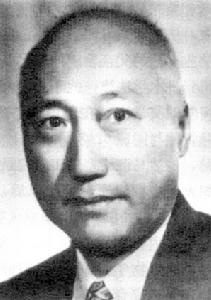Wu Hsien
Wu Hsien (born November 24, 1893 in Fuzhou , † August 8, 1959 in Boston ) was a Chinese biochemist and nutritionist.
life and work
Wu, who came from the port city of Fuzhou, successfully completed the state competitions for academics and was allowed to study in the USA from 1911. He studied shipbuilding and then chemistry at the Massachusetts Institute of Technology and from 1917 at Harvard University , where he received his doctorate in 1919 with Otto Folin with a dissertation on blood analysis. Shortly thereafter, he developed a method of blood sugar detection that became known as the Folin-Wu method. In 1920 he went back to China, where in 1924 he became head of the biochemistry department at the Peking Union Medical College, which was funded by the Rockefeller Foundation, and became an associate professor. In 1928 he became a professor, which he remained until 1942 when the college closed under Japanese occupation. He was on the Chinese National Scientific Standardization Committee and was a co-founder of the Chinese Physiological Society, of which he was temporarily president. He was an advisor to the Physiological Institute of Academia Sinica and its fellow. In the 1930s he did a lot of nutrition science.
In 1944, the Chinese government in Chongqing invited him to found a nutrition institute, which was to be established in Nanking after the end of the war . In 1947 he traveled to the International Congress of Physiologists in Oxford. He was now planning to set up an institute for human biology in China and traveled to the USA to get equipment and to get familiar with it (mass spectrometer, isotopes). Meanwhile, the communists had taken power in China. Wu's wife was able to travel to the USA with the five children in 1949 with great difficulty. Wu became visiting professor of biochemistry at the University of Alabama (Medical College). In 1952 he suffered a heart attack and retired in 1953. He recovered and moved to Boston, where he resumed his writing. In 1958 a second heart attack followed, which he succumbed the following year.
In 1924 he married the US-trained biochemist Daisy Wen, with whom he also worked a lot.
His son Ray J. Wu became Professor of Molecular Genetics at Cornell University .
In 1931 he suggested that denaturation of proteins was a result of a change in conformation, not a change in chemical composition. The idea was later picked up by Linus Pauling and others.
Honors and memberships
In 1932 he became a member of the Leopoldina . He was a member of the American Society of Biological Chemists and on the advisory board of Biochemica et Biophysica Acta.
literature
- C. Bishop, Hsien Wu (1893-1959): A biographical sketch, Clinical Chemistry, Vol. 28, 1982, pp. 378-380
- Daisy Yen Wu: Hsien Wu, 1893-1959; in loving memory, Boston 1960
- CG King: Wu, Hsien, in Dictionary of Scientific Biography
Fonts
- The principles of physical biochemistry, Beijing 1934
- Principles of Nutrition (Chinese), Shanghai 1929
Web links
- Member entry of Hsien Wu (with picture) at the German Academy of Natural Scientists Leopoldina , accessed on March 5, 2017.
Individual evidence
- ↑ Folin, Wu, A system of blood analysis, Journal of Biological Chemistry, Volume 38, 1919, pp. 81-110
- ↑ John T. Edsall, Hsien Wu and the First Theory of Protein Denaturation (1931), Advances in Protein Chemistry, Volume 46, 1995, pp. 1-5, Science Direct, Abstract
| personal data | |
|---|---|
| SURNAME | Wu Hsien |
| ALTERNATIVE NAMES | Wu, Hsien |
| BRIEF DESCRIPTION | Chinese biochemist |
| DATE OF BIRTH | November 24, 1893 |
| PLACE OF BIRTH | Fuzhou |
| DATE OF DEATH | August 8, 1959 |
| Place of death | Boston |
